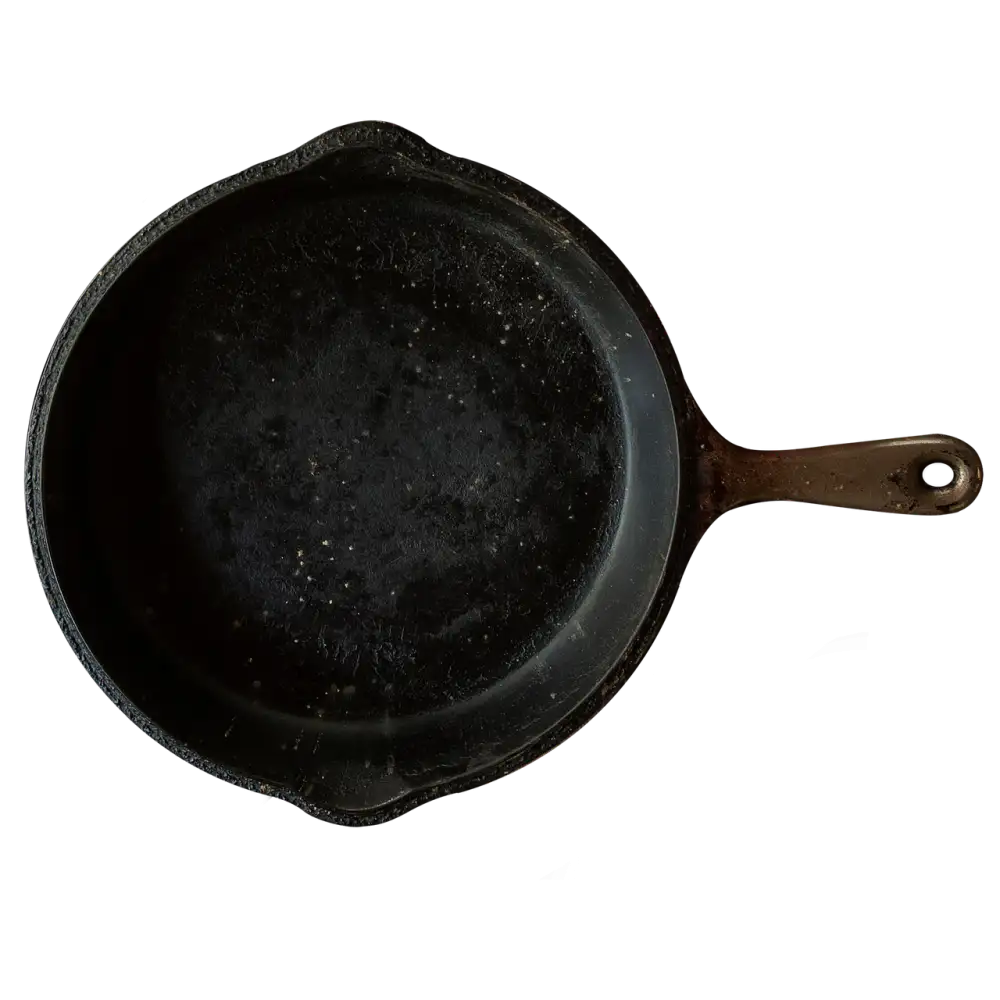Ultimate Guide: How to Clean a Cast Iron Skillet Like a Pro

- Gather materials: coarse salt, sponge, dish soap, paper towels, and a towel.
- Allow the skillet to cool completely before cleaning.
- Sprinkle coarse salt on the skillet to act as a gentle abrasive.
- Use a sponge to scrub the salt around the skillet, focusing on any stuck-on food.
- Rinse the skillet under warm water, avoiding the use of soap.
- Dry the skillet thoroughly with paper towels.
- Place the skillet on the stove over low heat to ensure it is completely dry.
- Once dry, apply a thin layer of oil to the skillet to prevent rusting.
- Store the skillet in a dry place to maintain its seasoning.
Gather materials: coarse salt, sponge, dish soap, paper towels, and a towel.
Before you begin cleaning your cast iron skillet, make sure you have all the necessary materials on hand. You will need coarse salt, a sponge, dish soap (optional), paper towels, and a towel. These items will help you effectively remove any food residue without damaging the skillet's seasoning. Having these supplies ready will ensure a smooth cleaning process and help maintain the quality of your cast iron cookware for years to come.
Allow the skillet to cool completely before cleaning.
Allowing the skillet to cool completely before cleaning is crucial to prevent any burns or injuries. Cast iron retains heat for a long time, so it's important to give it ample time to cool down. Attempting to clean a hot skillet can also damage its seasoning or cause warping. Waiting until the skillet is at room temperature ensures safe handling and effective cleaning results. So, be patient and let your cast iron skillet cool completely before starting the cleaning process.
Sprinkle coarse salt on the skillet to act as a gentle abrasive.
Sprinkling coarse salt on the skillet is a key step in cleaning a cast iron pan effectively. The coarse salt acts as a gentle abrasive that helps to loosen any stuck-on food particles without damaging the seasoning of the skillet. This method is preferred over using harsh chemicals or metal scouring pads, which can strip away the skillet's natural non-stick surface. By gently scrubbing the salt around the skillet with a sponge, you can easily remove any stubborn residue while preserving the integrity of your cast iron cookware.
Use a sponge to scrub the salt around the skillet, focusing on any stuck-on food.
After sprinkling coarse salt on the skillet, take a damp sponge and start scrubbing the salt around the skillet. Focus on areas with stuck-on food residue, applying gentle pressure to lift off any stubborn bits. The salt acts as a natural abrasive, helping to loosen food particles without damaging the seasoning of the cast iron. Continue scrubbing until the surface feels smooth and clean to the touch.
Rinse the skillet under warm water, avoiding the use of soap.
After scrubbing the skillet with salt, rinse it under warm water to remove any remaining residue. Avoid using soap as it can strip away the skillet's seasoning, which is essential for its non-stick properties. Instead, rely on the abrasive action of the salt and the heat of the water to clean the skillet effectively. Pat the skillet dry with paper towels to prevent any water spots or rust from forming.
Dry the skillet thoroughly with paper towels.
After rinsing the skillet under warm water, it's crucial to dry it thoroughly to prevent rusting. Use paper towels to wipe off any remaining moisture on the surface of the skillet. Make sure to reach all the nooks and crannies, including the handle and edges. Properly drying the skillet is essential for maintaining its seasoning and preventing any water damage. Once you've dried the skillet completely, proceed with the next step in caring for your cast iron cookware.
Place the skillet on the stove over low heat to ensure it is completely dry.
After drying the skillet with paper towels, it's important to ensure that it is completely dry to prevent rusting. To do this, place the skillet on the stove over low heat for a few minutes. This will help evaporate any remaining moisture and ensure that the skillet is thoroughly dried. Be sure to keep an eye on it to prevent overheating, as excessive heat can damage the seasoning of the cast iron skillet.
Once dry, apply a thin layer of oil to the skillet to prevent rusting.
Once the cast iron skillet is completely dry, it is essential to apply a thin layer of oil to prevent rusting. This process helps to maintain the skillet's seasoning and protect it from moisture. Use a neutral oil with a high smoke point, such as vegetable oil or flaxseed oil, and apply it evenly across the entire surface of the skillet, including the handle. Wipe off any excess oil with a paper towel before storing the skillet in a dry place. Regularly oiling your cast iron skillet will help prolong its lifespan and keep it in top condition for cooking delicious meals.
Store the skillet in a dry place to maintain its seasoning.
To maintain the seasoning of your cast iron skillet, it is crucial to store it in a dry place. Moisture can lead to rusting and damage the skillet's seasoning. After cleaning and drying the skillet thoroughly, find a spot in your kitchen where it can be stored away from any sources of moisture. Avoid stacking other items on top of the skillet to prevent any potential scratches or damage to its surface. By storing your cast iron skillet in a dry environment, you will help preserve its seasoning and ensure its longevity for many more delicious meals to come.
Published: 14. 03. 2024
Category: Home



